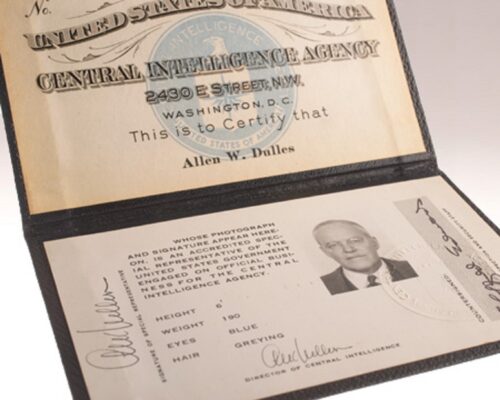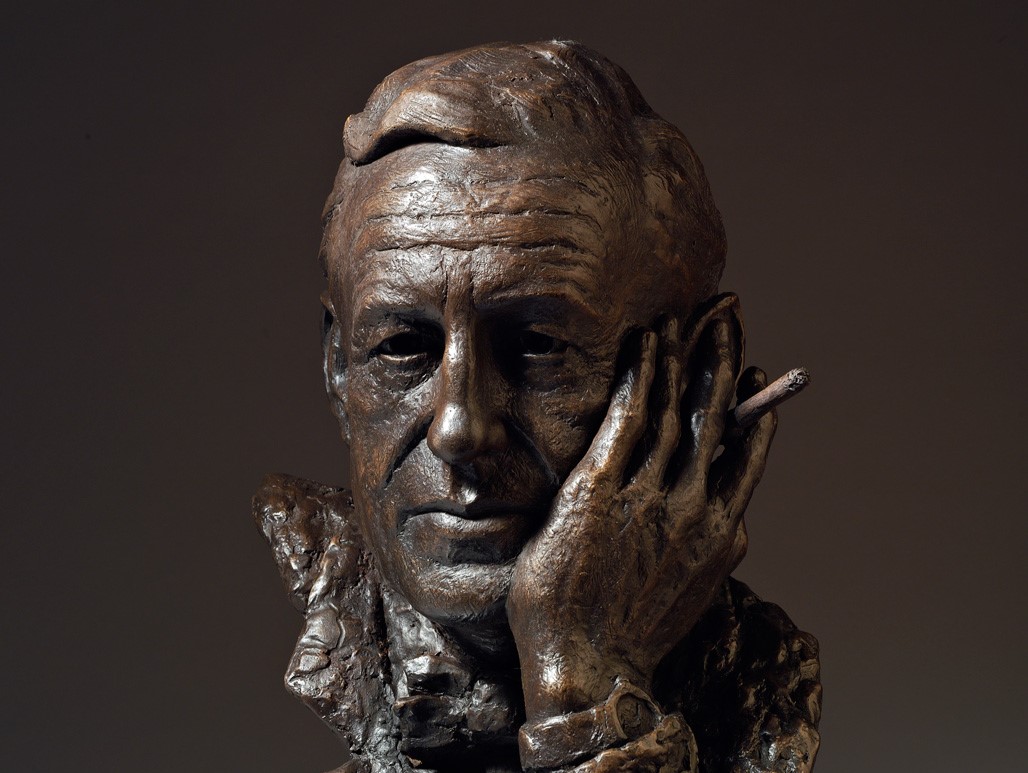Bronze bust of the author Ian Fleming by the British sculptor Anthony Smith. Commissioned by the Fleming family to commemorate the centenary of Ian Fleming’s birth in 2008. Photo: Fortheloveofknowledge / CC BY-SA 4.0 DEED. Cropped.
Dr. Christopher Moran from the University of Warwick conducted a study titled Ian Fleming and the Public Profile of the CIA1. The study explores the relationship between Allen Dulles and Fleming, focusing on their mutual admiration and influence. It reveals how their interactions went beyond mere correspondence and gadgetry, shaping both the Bond novels and the CIA’s public image during the Cold War.
Ian Fleming, the mastermind behind the iconic James Bond franchise, and Allen Dulles, the former Director of Central Intelligence (DCI), shared a longstanding friendship. They exchanged letters regularly, discussing a wide range of topics. Interestingly, their correspondence included discussions about the James Bond novels, revealing their shared interests and mutual admiration.
In the James Bond novel You Only Live Twice, there are intriguing mentions of the DCI. This connection underscores the fascinating intersection of fiction and reality within the world of espionage. The fictional universe of James Bond, with its spies, intrigue, and high-stakes missions, seemed to resonate with the real-world intelligence work carried out by Dulles and the Agency.
Dulles and Fleming conducted a published dialogue int the June 1964 issue of Redbook magazine: ALLEN DULLES AND IAN FLEMING (cia.gov). Their conversation covered a variety of subjects, including female spies, the John F. Kennedy era, and the Official Secrets Act. This interview provides a rare glimpse into the perspectives of two influential figures in the intelligence community.

Tn a rediscovered 1964 edition of Life Magazine, Dulles described his meeting with the ‘brilliant and witty’ Fleming in London in 1959. During this encounter, Fleming expressed his belief that the CIA was not doing enough in the area of “special devices”. This conversation likely influenced the Agency’s subsequent actions.
Dulles, impressed by Fleming’s insights, urged the CIA’s technical staff to replicate as many of Bond’s gadgets and devices as possible. The agency successfully copied some of these outlandish inventions, such as Rosa Klebb’s infamous spring-loaded poison knife shoe from the film From Russia with Love. However, they faced challenges with other devices, like the homing beacon used in Goldfinger, which proved less effective in real-world scenarios.
Beyond gadgetry, their relationship extended to public relations. In return for Dulles’s promotion of the Bond novels, Fleming agreed to include glowing references to the Agency in his later Bond novels. As a British author, Fleming had the freedom to discuss the CIA openly, unlike the U.S. media and cultural establishment at the time. Thus, the James Bond books played a significant role in shaping the CIA’s public image during the Cold War
In Summary
The relationship between Ian Fleming and Allen Dulles was multifaceted. They were more than just acquaintances; their friendship spanned years. Dulles’ real-world experiences likely influenced aspects of the James Bond novels. Their interactions continue to captivate fans of both espionage fiction and historical intelligence.
Whether it was over letters, within the pages of Bond novels, or during interviews, the bond between these two remarkable individuals remains a fascinating chapter in the annals of intelligence and literature.
Endnotes
1. Christopher Moran; Ian Fleming and the Public Profile of the CIA. Journal of Cold War Studies 2013; 15 (1): 119–146. doi: https://doi.org/10.1162/JCWS_a_00310
Resources
Central Intelligence Agency
CIA.gov
The Official James Bond 007 Website
007.com
The Official Website for Ian Fleming
IanFleming.com
*The views and opinions expressed on this website are solely those of the original authors and contributors. These views and opinions do not necessarily represent those of Spotter Up Magazine, the administrative staff, and/or any/all contributors to this site.
